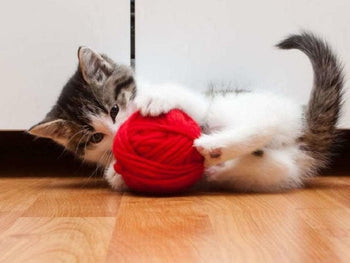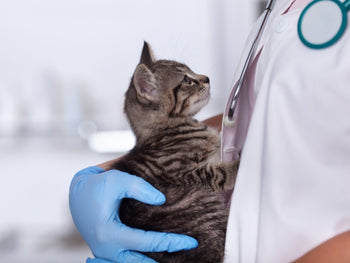Furry animals, including cats, run high risks of being infected with worms. The lack of proper deworming can lead to many long-term problems. But, how long after deworming a cat are the worms gone? Not all cat owners are aware of the accurate answer to this issue.
Deworming pets (sometimes known as worming) is a natural step in taking care of your lovely friends. As a pet owner, it is essential to know what will happen after your pet is dewormed. Have you ever asked yourself the question “How long after deworming a cat are the worms gone”? If not, go on reading to find the answer below!
What are types of worms?
Based on the certain kind of worms that your cat gets, the vet will recommend the suitable method of treatment. There are three most common parasites that often bother cats, including tapeworms, roundworms, and hookworms. Tapeworms, which are spread by fleas, are detected like little rice bits inhabiting on cat fur near their hindquarters or in their bed. On the other hand, roundworms much resemble what you expect to see from a worm. If your cat continues throwing up a small, whitish coil, there is a high chance that he gets roundworms. Gather any evidence of worms into a plastic sandwich bag to bring along to the vet clinic so that the vet can diagnose and prescribe the proper treatment.
Once entering the cat’s body, tapeworms aren’t considered foreign by its immune system, so it doesn’t produce antibodies to attack these worms. This means that the pet develops no protection to tapeworm infections. In the meantime, roundworms and hookworms migrate through the cat’s body. Throughout the migration, such worms encourage the body’s production of antibodies. Thus, adult pets that have fully developed their immune system can naturally get rid of roundworms and hookworms some time in their life. Otherwise, deworming is also necessary in case the number of roundworms and hookworms exceeds the capacity of the immune system to handle.
How can cats get infected by worms?

In general, cats often get worms through contact with eggs or infected particles in feces. They step in feces by accident and ingest them when grooming themselves. The worm larvae then grow into worms in the cat’s intestines. Or else, they are bitten by worm larvae that penetrate their skin. Nursing from an infected mother can be another factor that causes intestinal worm in cats. In particular, cats with an active social life run higher risks of getting worms. This is because rodents or birds that those cats may catch contain enough worms to infect them.
If not properly treated, worm infection will lead to a wide range of serious problems, like weight loss, dehydration, digestive problems, irritation around the back end, and poor coat condition. In the worst scenarios, death is unavoidable.
How long after deworming a cat are the worms gone?
When it comes to killing worms together with their eggs and larvae, there is a wide range of treatments available, ranging from natural remedies to prescription medications. Remember that the treatment method applied to one type of worm won’t eradicate another type, so never use leftover medicines to treat a new infection. So how long after deworming a cat are the worms gone?
The type of worms the cat has and the treatment option provided by your vet will decide the period of time it takes him to recover. In general, most medications take effect in just several days. However, the vet may ask you to continue giving your cat these doses for up to two weeks to make sure that the parasites have completely disappeared out of your sight. If possible, a follow-up exam in three or four weeks of treatment is necessary to ensure your cat is always worm-free.
How do wormers work?
Wormers act as an anti-parasitic agent to eliminate any worm eggs or larvae living in the body and pass them out together with feces. However, unlike vaccination, wormers are only efficient in killing active worms and do not prevent worm re-contracting in the future. Therefore, regular deworming is no doubt.
How do wormers take effect?
Most medications are able to kill adult worms within 24 hours of intake. In some special cases, it takes a second dose between 3 and 4 weeks later to kill the rest, which was larvae at the time of treatment.

How do wormers take effect?
On the whole, a cat is likely to re-contract worms shortly after receiving a deworming dosage. It takes about three months for the worms within its body to grow and reproduce to a level that endangers the cat’s health. For cats as prolific hunters, the period that the worms are gone after deworming is shortened to two months. As for kittens, deworming should be given every two weeks from 6 weeks to 3 months of age, then monthly until they reach 6 months old. As for cats between 6 and 12 months, they should receive deworming treatment every three months. For those older, intervals of three to sixth months are adequate.
Check us our for various astonishing cat tips & facts!
Tips to minimize risks of re-infection in cats
- Strictly comply with a year-round regimen of flea prevention, including oral doses, collars, and topical applications.
- Keep your cat indoors so that he cannot hunt or eat infected rodents. If possible, ask the vet to prescribe a preventative pill to prevent him from getting worms.
- Take care while cleaning up cat feces after deworming for fear of getting infected with worm larvae. Also, remember to wash your hands after playing with him.
- Frequently empty your pet’s litter tray and disinfect their water and food bowls.
- Take precaution measures to rid of fleas: washing all your cat’s favorite blankets and pillows, vacuuming carpets frequently as well as cleaning up organic debris which is the familiar shelter of fleas such as clippings, straw, and leaves. Pay attention to dark, shady, and moist areas, where there are many favorable conditions for fleas to breed and grow.
Conclusion
So, how long after deworming a cat are the worms gone? The problem of worm infection is a splitting headache for every cat owner. To prevent further serious health issues to the cat himself and your family members, instant deworming treatment is undoubtedly essential. Watch out for the duration of effect that each dose can take to apply the next doses in time.
Find out more about cats' health issues at Cattybox!









